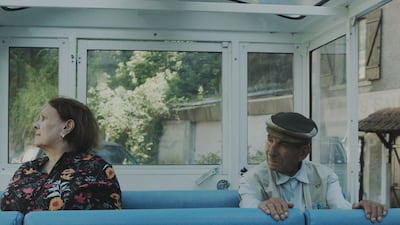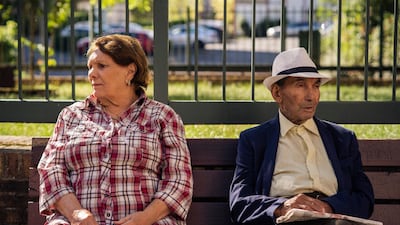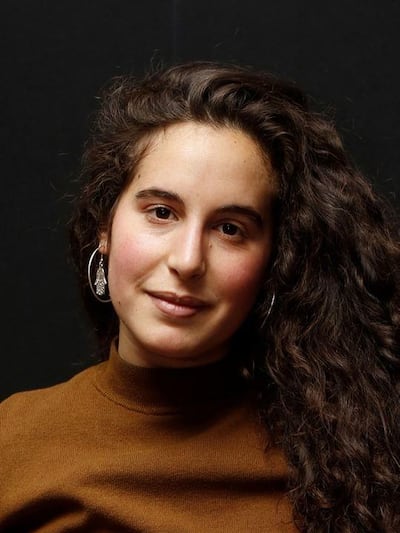The powerful Their Algeria begins with footage filmed in 1992, of director Lina Soualem, then merely two years old, visiting her paternal grandparents' house in Thiers, central France, with her father, French actor Zinedine Soualem (her mother is acclaimed Palestinian actress Hiam Abbass). Cut to 2017, and Soualem is on Skype with her father on the other end of the video call, showing her around the empty apartment his parents used to live in. Then comes the heartbreaking revelation that after 62 years of marriage, the director's grandparents are separating.
Their Algeria, which won the inaugural Docs-in-Progress Award in Cannes last year, a €10,000 (Dh40,000) cash prize, is a documentary that details how the Soualem's grandparents cope with the split and their reminiscences about their marriage. The film is debuting at the 51st Visions du Reel festival this week.
The event, which usually takes place in Nyon, Switzerland, is happening virtually this year, amid the coronavirus pandemic. Swiss viewers will be able to access Soualem’s film online from Saturday, April 25, to Saturday, May 2.
“The difficult thing is that I heard about the separation while I was abroad,” Soualem says on the phone from her apartment in Paris. “When my grandparents separated, it was so sudden. No one was expecting it to happen.”
Initially, she only wanted to film her grandmother. It’s easy to see why when watching the documentary. Aicha Aidaoui Soualem lights up the screen, whether it’s the coy way in which she talks about her first encounter with Lina’s grandfather, Mabrouk Soualem, or her cooking food or describing how she and her husband had terrible levels of communication for decades. Remarkably, after their separation, the couple moved into, and still live in, apartments 30 metres apart from each other, and Aicha still cooks food for Mabrouk.
Filming was a revelatory experience for the director. “I had no idea that my grandparents had not met each other before they married,” she says, as it was an arranged marriage and the couple met for the first time on their wedding day. “I really loved it when she told me that their first encounter was like you see in the movies.”
But interviewing her grandmother wasn’t enough. Soualem realised she needed more voices in the film. “I couldn’t understand the story without understanding what my grandfather went through,” she says.
“Then I realised that something else was missing – the link between them and me, which is my own dad. So I decided to film him, too.”
The dynamic between the three protagonists is electrifying: “My grandmother and my father, they have this way of teasing each other, which I love,” says Soualem. “Then my grandfather and my dad have the same facial features, so little by little my dad took a more important place in the film.”
The daughter of the two famed actors rejected the film business for a long time. “I felt like I had a duty to do something more serious,” she says. “I studied history and political science, and did my master’s in international relations. I wanted to work in cultural diplomacy.”
However, things changed once she completed university. “I understood that I always wanted to be in cinema and the arts,” she says. “But I didn’t want to say so because both my parents were. Then I discovered documentary filmmaking. I started to programme for a human rights film festival in Argentina and saw that through documentary films, it’s possible to tackle social, political and historical issues. I could talk artistically about things that interest me.”
Soualem saw Their Algeria as an opportunity to talk about the relationship between France and Algeria. The film also incorporates archive footage from the 1940s and 1950s. Her grandparents left Algeria in the 1950s with the intention of returning when hostilities died down. However, by the time fighting lessened, their children were doing well at school, so returning to North Africa seemed like an upheaval.
A couple of years before they separated, I went to Algeria for the first time with my university,” says Soualem. “While there, I realised I had no idea how my grandparents were involved in that political and historical context. I knew the region they were from, but I didn’t know their social backgrounds, how they grew up, how they came to be in France.”
The documentary took on an added poignancy for the director earlier this year when her grandfather, who worked as a cutler, died. Their Algeria is dedicated to him. "It's weird," she says. "I'm happy he died before this pandemic. Otherwise, he would have been home alone, and we wouldn't have been able to take care of him. We could all be at his funeral and share this moment with my family because people who are dying now, it's difficult for the families."
Initially Soualem was reluctant to take part in a virtual world premiere, but her grandfather’s death encouraged her to ahead, as a way of celebrating his life. She knew there was no guarantee festivals would take place in the traditional way soon, and she didn’t want to wait.

Showing the documentary to her dad was the final task. “He was really touched because he sees his dad telling me things that they would never have been able to talk about.”
The 2020 Visions du Reel Film Festival is online from Friday, April 17 to Saturday, May 2



